The Mahabharata is one of the greatest literature’s in the world. No other work brings out the complexity of human problems in such a profound and entertaining way. It shows us the application of philosophy when it comes to deciding between the right and wrong in such cases where the answer is not straightforward.
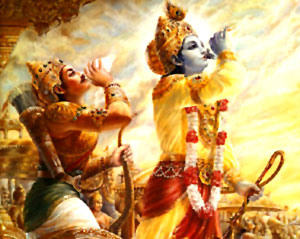 Four of the most striking characters in the Mahabharata are Arjuna,Karna,Drona and Bhishma . These men were perhaps the four greatest warriors of the era and were also well learned and had firm principles by which they lived.
Four of the most striking characters in the Mahabharata are Arjuna,Karna,Drona and Bhishma . These men were perhaps the four greatest warriors of the era and were also well learned and had firm principles by which they lived.
They lived their life by different values and their lives came to very different ends. The Mahabharata shows that all four men were great in their own way, but three of them failed in doing what is truly right and therefore came to futile ends, their lives not serving the greater good.
Out of the four characters, Arjuna is the character who stands out as the hero who future generations of Hindus admire the most. The other three are remembered as tragic heroes. Their names are not associated with the same awe and respect as that of Arjuna. They all met sad deaths on the battlefield, fighting on the side of evil despite knowing in their hearts that they were doing wrong
There is a fundamental difference in the outlook and character of these four great men that was responsible for their different outcomes.
Karna
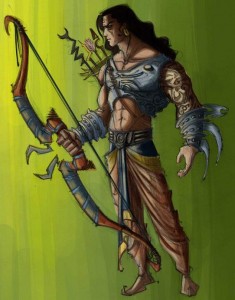 Karna was a great warrior, in many ways greater than Arjuna. They may have been equal as archers, but physically, Karna was by far the stronger of the two. And even in sticking to one’s principles, Karna appeared more steadfast compared with Arjuna. But in Karna’s life there was one fatal flaw. He made his friendship and loyalty to Duryodhan higher than anything else, even higher than right and wrong, and even higher than God. While loyalty is a great value in such cases when it overrides a sense of dharma and even the direct calling of the Divine in the form of Shri Krishna, such loyalty leads one to a tragic end.
Karna was a great warrior, in many ways greater than Arjuna. They may have been equal as archers, but physically, Karna was by far the stronger of the two. And even in sticking to one’s principles, Karna appeared more steadfast compared with Arjuna. But in Karna’s life there was one fatal flaw. He made his friendship and loyalty to Duryodhan higher than anything else, even higher than right and wrong, and even higher than God. While loyalty is a great value in such cases when it overrides a sense of dharma and even the direct calling of the Divine in the form of Shri Krishna, such loyalty leads one to a tragic end.
Karna used all his strength to serve his friend Duryodhan, without even one selfish thought for himself. However, his loyalty was so blind that he would even follow his friend when he was doing something totally wrong, selfish and harmful to others. This shows that loyalty to another person can lead even a great man to a tragic end. Dharma, and the call of God, must always be greater than loyalty to another. Karna knew what he was doing was wrong and paid the price for it.
Karna put loyalty to Duryodhan as his highest loyalty. His tragic story warns us to choose loyalties wisely. Only Krishna deserves such unflinching loyalty.
Bhishma
 Bhishma was another person who never performed a selfish action in his whole life. He was mighty, learned and respected. But he too ended up fighting on the side of adharma, and came to a tragic end. He was actually an impediment to the establishment of a righteous kingdom. Why? Because he put his personal oath on a pedestal and made it the focus and obsession of his life.
Bhishma was another person who never performed a selfish action in his whole life. He was mighty, learned and respected. But he too ended up fighting on the side of adharma, and came to a tragic end. He was actually an impediment to the establishment of a righteous kingdom. Why? Because he put his personal oath on a pedestal and made it the focus and obsession of his life.
That oath was that he would unquestioningly follow and do the bidding of whoever was the king of Hastinapur (Delhi). This vow, he would never break as long as he lived, even when it involved fighting his own beloved nephews who he knew had done nothing wrong.
Sticking to a vow is important, especially today when people make promises and break them the very next day (or even the very next second). But the Mahabharata demonstrates that if your attachment to a personal vow stops you from doing what is blatantly right, and ends up making you serve evil, such a vow should be discarded and set aside.
Bhishma put his personal vow above anything else, even when that vow became an instrument of evil. He disregarded Krishna’s advice, which was that to drop the vow for the greater good.
Drona
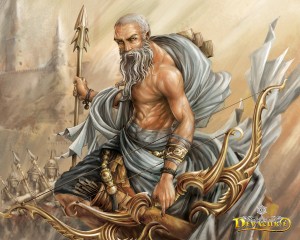 Drona was an employee of the king of Hastinapur, who happened to be Dhitirashtra, the father of Duryodhana. He was employed to teach all the princes of that kingdom in the art of warfare and statecraft, and was considered the very greatest teacher of the era. For his services, he was remunerated handsomely. Before he got this job, he was very poor and therefore was very grateful to the King for employing him.
Drona was an employee of the king of Hastinapur, who happened to be Dhitirashtra, the father of Duryodhana. He was employed to teach all the princes of that kingdom in the art of warfare and statecraft, and was considered the very greatest teacher of the era. For his services, he was remunerated handsomely. Before he got this job, he was very poor and therefore was very grateful to the King for employing him.
When Duryodhan was doing wrong, Drona was fully aware of it. On some occasions he even tried to stop Duryodhan, at which Duryodhan would say: “Do not bite the hand that feeds you.”
When the battle finally dawned, Drona fought on Duryodhan’s behalf and was eventually slain in a scheme engineered by Krishna. Drona, despite being an outstanding warrior, and well versed in morality, put his loyalty towards his employer before the more important and fundamental question of dharma. Despite knowing better, he never quite had the guts to just leave and tell the king – “Enough is enough, what you are doing is wrong, I will not support you anymore.” He was too afraid of being called ungrateful.
Drona put his loyalty towards his employer above the bidding of Shri Krishna who tried to tell Drona not to keep supporting the side of evil just because of his loyalty to his employer.
Arjuna
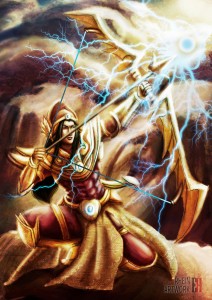 Arjuna was a great man. Yet he had weaknesses that were actually absent in Karna, Bhishma and Drona. He was in some ways foolhardy, saying and doing several stupid things that could have landed his brothers and himself in serious trouble.
Arjuna was a great man. Yet he had weaknesses that were actually absent in Karna, Bhishma and Drona. He was in some ways foolhardy, saying and doing several stupid things that could have landed his brothers and himself in serious trouble.
For example, at one point, Arjuna had made a vow that he would take the life of anybody who insulted his ‘Gandiva bow’, which he was exceedingly proud of. During the Mahabharata war, it happened to be Arjuna’s eldest brother and leader, Yuddhistir, who dealt the fatal insult.
Arjuna drew his sword and was about to kill his own brother, and was restrained only by Krishna’s presence. Instead of killing Yuddhistir, Arjuna instead insulted him in public. But then, Arjuna felt bad for insulting such a virtuous person as Yuddhistir, and said that he would commit suicide as there was no point even being alive after doing something so vile as insulting his own brother in public! Once again, it was only Krishna’s presence which restrained Arjuna. Krishna eventually talked Arjuna out of suicide, but Arjuna was sad that he had not kept his own word,and felt very bad. Krishna gave Arjuna a loophole. According to dharma, praising yourself in public is a sin that is as bad as one’s own death. So Krishna said to Arjuna that just praise yourself in public, and your vow will be fulfilled. And thus were the lives of both Arjuna and Yuddhistir saved.
Yet despite this foolhardy streak in his character, Arjuna is the one who is etched upon the heart of humanity as the ideal to which to aspire.
 This story illustrates that while Arjuna was far from perfect, he had one over riding quality which sets him above and apart from the others. To Arjuna, it was Krishna’s words that were absolute. He would follow Krishna’s words even at the expense of other principles or promises that he held dear. Therefore he had the grace and favour of Krishna’s guidance throughout his life.
This story illustrates that while Arjuna was far from perfect, he had one over riding quality which sets him above and apart from the others. To Arjuna, it was Krishna’s words that were absolute. He would follow Krishna’s words even at the expense of other principles or promises that he held dear. Therefore he had the grace and favour of Krishna’s guidance throughout his life.
Therefore, Arjuna’s fate was to be the hero of the era, and the instrument of God in being the restorer of dharma to society, rather than a tragic figure who ended up wasting their huge life potential in fighting on behalf of a fake cause. Arjuna put Krishna as his highest guide and ideal, and despite his faults, stands out as the most successful and glorious of the four.
Conclusion
The comparison between Karna, Drona, Bhishma and Arjuna shows us that while we can admire a person’s loyalty to a friend, loyalty to their employer and dedication to their principles or promises, all of these things must never be allowed to become an obstacle in doing what is truly for the benefit of the greater good. Krishna, the divine guide, will always shower his grace on people who will put Him first, and thus we remember Arjuna as the true hero above any of his contemporaries.
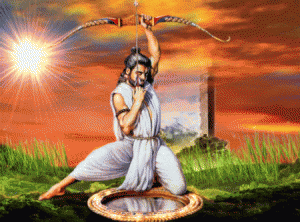





![[Dattastavastotram+copy.JPG]](https://blogger.googleusercontent.com/img/b/R29vZ2xl/AVvXsEhlaJ4xlcnNnAC_TPzinxq7yS10ylyMK00ayW-JLfVFqaCJ7Wg9Rem8tE_lDcGBiILMSCQOokEtbKZj0Rc2NiloAWz8sOoCWAEtcEjWaMap9bU2IBmi-imMLVrdea98HEK3-6vOQ40f9U0/s1600/Dattastavastotram+copy.JPG)
